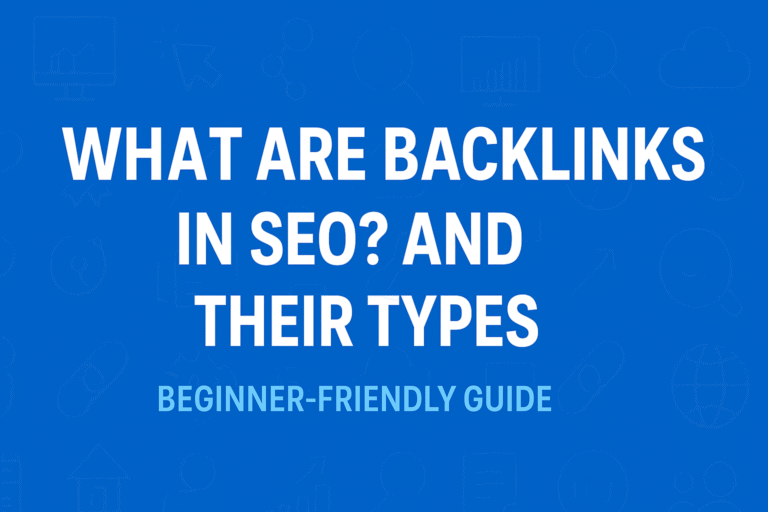
You could have come across the word backlinks many times if you are learning SEO. But what exactly are they, and why do they matter so much in ranking a website on Google?
What are Backlinks in SEO?
Simply stated, a backlink is when another website connects to yours. Google and other search engines see this link as a suggestion or “vote of confidence” for your website. Your website seems more credible and authoritative in Google’s sight the more excellent backlinks it has.
Imagine you just opened a fresh café in your hometown. More people would hear about your café if local newspapers, food bloggers, and influencers all mentioned it and linked to your website. Google also views trustworthy sites linking to your content as evidence of your website’s worth.
The foundation of off-page SEO are backlinks; they can help or destroy your website ranking. Let’s understand backlinks step by step.
What are backlink examples?
A backlink is a hyperlink on another website that points to your site.
Example 1:A travel blogger writes an article on “Top 10 Beautiful Places in India” and links to your travel agency website → this is a backlink.
Example 2: A news website publishes an article about your startup and adds your homepage link.
Example 3: Someone on a Q&A forum (like Quora) answers a question and recommends your blog post with a link.
Why Are Backlinks Important?
One of Google’s top ranking factors is backlinks. Here is why backlinks are important for ranking:
- Boost Search Rank : Google views backlinks as an indicator of trust. Your website’s ranking can rise depending on the amount of high-quality backlinks it possesses. Example: Assuming two websites publish similar content, the one with more high-quality backlinks will probably rank higher.
- Generates Referral Traffic: Users can click on backlinks from other sites and land directly on your page. This draws more visitors to your website.
- Build Authority and Trust: Your website becomes credible when trustworthy sites such Forbes, Wikipedia, or industry blogs link to you.
- Speeds up indexing: Links help search engine robots to crawl the internet. Particularly if your site is new, backlinks let people locate it more quickly.
👉 In short, backlinks are recommendations. Your website will become increasingly apparent the more reliable backlinks you receive.
Types Of Backlinks
Not every backlink is the same; some can significantly boost your SEO while others might not matter much. Let’s go through the several kinds:
1. DO Follow Backlinks
- These are the most worthy kind of links.
- They forward link juice( SEO Value) to your website.
2. No Follow Backlinks
- These guide search engines not to pass SEO value.
- Though they can generate traffic and brand recognition, they do not directly affect rankings.
- Example: link found in social media, blog remarks, or YouTube descriptions.
3. Editorial backlinks
- Found naturally when other sites link to and refer to your content since it helps.
- Example: A journalist quotes your research in their article
4. Guest Post backlinks
- Add your website URL within the article you submit for a different site.
5. Directories and Businesses Listing Backlinks
- Links from internet directories like Google Business Profile, Yelp, Justdial, etc.
6. Links from Forums and Communities
- Links are dispersed on Q&A sites, forums, and internet groups.
Note: Low-quality backlinks—like, spammy links from unrelated sites—can damage your site rather than benefit it. Quality always defeats quantity.
How to Get an SEO Backlinks
Now that you learned what backlinks are and their importance, the next move is to discover how to actually create them. Though this can seem confusing for beginners, don’t be concerned; I will simplify it into easy strategies you can follow
Here is some beginner-friendly methods to create backlinks:
1. Write High Quality Content.
- Backlinks are built on content. If your website has nothing of value to reference, nobody will link to it.
- Write Detailed Blogs and Guides: Rather than composing a brief 500-word content, create thorough content (1000–2000+ words) that clarifies a subject better than your competitors. Example: Instead of “Benefits of Yoga,” write “The Ultimate Beginner’s Guide to Yoga: Poses, Benefits & Daily Routine.”
- Develop Visual Content (Infographics, videos, Case Studies):People like linking to original research or simple to understand graphics. Example: Other websites may embed your infographic and link back to your blog if you run a food blog. Create an infographic highlighting “10 Easy Breakfast Recipes in 5 Minutes.”
- Original Research and Case Studies: Post your own results—for example, how you boosted website traffic by 200% in three months. Because of its originality, such content is very linkable.
People will naturally link to your content if it answers the questions better than others.
2. Guest Posting
Guest posting is one of the most popular and beginner-friendly ways to earn backlinks.
- What is Guest Posting?: Guest posting is writing an article for a different website in your field. In return, you receive a backlink to your website (either within the article or in your author bio).
How to Start:
- Search on Google: your niche + write for us. Example: “fitness blog write for us”.
- Approach the website owner and suggest a topic.
- Write a valuable article for their readers.
- Include your backlink organically in your bio or in the content.
- Example: If you run a travel website, you might write an article for a well-known travel blog under the title “Top 10 Hidden Destinations in India.” At the end, include: “For more in-depth guides, visit [Your Travel Blog].”
Tips: Choose sites with excellent domain authority, not spammy ones that publish anything.
3. Broken Link Building
Though this approach seems technical, it is really basic and rather potent.Broken Link Building is when websites have links that are 404s, or dead. You can support them by offering your content as a substitute.
How to Start:
- Search for websites in your field of expertise (e.g., gardening blogs).
- Broken links may be found using tools like Ahrefs or Check My Links ( Chrome extension).
- Email the site owner if you see a broken link related to your content.
- Offer your blog as a substitute for the corrupted link.
- Example: A blog links to a guide on “Organic Farming Tips” but the link is dead. If you have a similar article, you can say: “Hi, I noticed you have a broken link in your article. I recently wrote a detailed guide on organic farming that could be a useful replacement. Would you like me to share it?”
👉 This way, you help them fix their site, and you earn a backlink in return.
4. Business Listings and Directories
Directories are a quick and easy approach to acquire backlinks if you have a business (offline or online).
What are Business Directories?: They are internet sites listing companies across several sectors. Examples: Google Business Profile, Yelp, Sulekha, Justdial, IndiaMart.
How to Use Them:
- Create a business profile.
- Include your phone number, services, address, and website.
- Submit and verify your listing.
- Example: If you own a bakery, you may include it on Google Business Profile. Your website link will appear to others looking for “bakery near me.”
Tip: Make sure you only use reliable directories. Stay away from directory scams since they could harm your search engine optimization.
5. Build Relationships
Backlinks often come from connections. If you want other people to link to your website, you need to build genuine relationships in your niche.
How to Build Relationships:
- Make comments on other blogs with insightful ideas—not just “Nice post!”
- Tag their articles and share them on social media.
- Get in touch with bloggers and writers on LinkedIn, Twitter, or email.
- Offer collaborations (guest posts, expert roundups, interviews).
- For example, if you manage a health blog, you might contact a nutritionist and inquire: “I’m working on a piece about good diets. Could I include your opinion in my blog?” You could get a backlink from their website if they share your blog.
Tips: The more you interact with people in your field, the more opportunities you will find naturally for backlinks.
6. Social Sharing & PR (Public Relations)
Sometimes, backlinks result from individuals finding your content on news sources or social media
- Social Media Sharing:
- Share your blog on Facebook, Instagram, LinkedIn, Pinterest, and Twitter.
- Join niche groups (like Facebook communities) and post helpful content.
Content Promotion via Email:
- Send your blog to your followers.
- Reach out to bloggers/journalists and tell them about your content.
Press Releases & News Mentions:
- Send press releases to media outlets if your company has news—for instance, releasing a fresh product. Many times, they will include your link.
- Example: Publishing a guide “The State of Digital Marketing in 2025” and sharing it on LinkedIn could lead a marketing blog to find it and link to it in their own post
Tips: The more visibility your content gets, the more backlinks you can earn..
Backlinks do not come overnight. Think of it like constructing a reputation: produce high-caliber content, advertise it, interact with people, and over time, other sites will begin to link to you.
